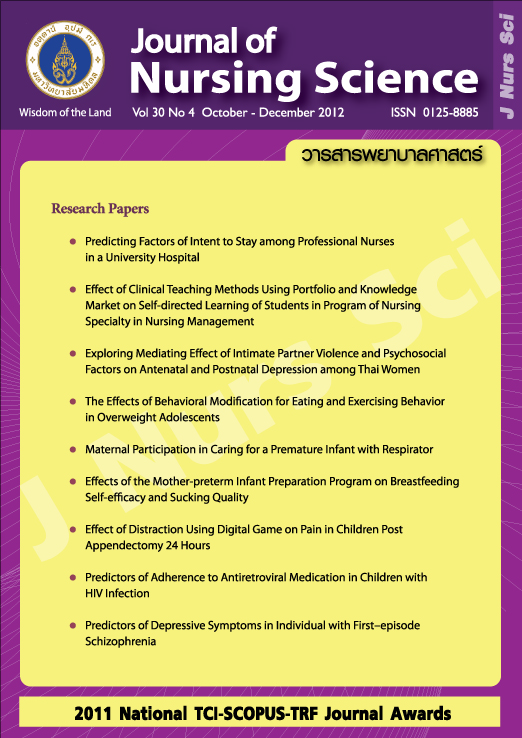Exploring Mediating Effect of Intimate Partner Violence and Psychosocial Factors on Antenatal and Postnatal Depression among Thai Women
Main Article Content
Abstract
Purpose: To explore the influence of mediating variables from intimate partner violence (IPV) and psychosocial factors (i.e., stress, social support, and self esteem) on antenatal and postnatal depression among Thai women.
Design: Prospective design.
Methods: This study used a secondary data obtained from 420 pregnant women during their 38-42 weeks of pregnancy. Participants were firstly asked with a set of questionnaire that assessed abused status, types of violence, psychosocial factors, and antenatal depression. Then at the 4th week postpartum, they were asked again for postnatal depression. Statistical analysis was performed by Structural Equation Modeling (SEM) to test whether IPV impaired women’s psychosocial factors and thus subsequently increased the risk for antenatal and postnatal depression.
Main findings: IPV has a significant positive direct effect on antenatal depression (β = 0.783, p = .000) and has a significant positive indirect effect on postnatal depression (β = 0.694, p = .000) through stress, social support, self-esteem, and antenatal depression, respectively. The model fit to the empirical data very well (χ2 = 8.982, df = 9, p = 0.439, GFI = 0.995, AGFI = 0.979, RMSEA = 0.000) and could explained 56% of variance of postnatal depression.
Conclusion and recommendations: Nurses should screen IPV among Thai pregnant women. If abuse is found, nursing intervention for reducing stress and providing social support as well as empowering their self-esteem should be implemented urgently to prevent antenatal and postnatal depression.
Keywords: depression, intimate partner violence, meditational effect, psychosocial factors
บทคัดย่อ
วัตถุประสงค์: เพื่อศึกษาอิทธิพลของตัวแปรส่งผ่านจากความรุนแรงที่เกิดจากคู่สมรสและปัจจัยทางจิตสังคม (ได้แก่ ความเครียด การสนับสนุนทางสังคม และความรู้สึกมีคุณค่าในตนเอง) ต่อภาวะซึมเศร้าก่อนคลอดและหลังคลอดในสตรีไทย
รูปแบบการวิจัย: การวิจัยแบบติดตามไปข้างหน้า
วิธีดำเนินการวิจัย: การวิจัยครั้งนี้เป็นการใช้ข้อมูลทุติยภูมิจากสตรีตั้งครรภ์จำนวน 420 คน ซึ่งมีอายุครรภ์ระหว่าง 38-42 สัปดาห์ กลุ่มตัวอย่างได้รับการสอบถามครั้งแรกด้วยชุดแบบสอบถามเพื่อประเมินการถูกทำร้าย ชนิดของความรุนแรง ปัจจัยทางจิตสังคม และภาวะซึมเศร้าก่อนคลอด เมื่อครบสี่สัปดาห์หลังคลอดกลุ่มตัวอย่างได้รับการสอบถามอีกครั้งเพื่อประเมินภาวะซึมเศร้าหลังคลอด วิเคราะห์ข้อมูลโดยการทดสอบสมการเชิงโครงสร้าง เพื่อพิสูจน์ว่าความรุนแรงที่เกิดจากคู่สมรสมีผลต่อปัจจัยทางจิตสังคมของสตรีหรือไม่ และผลดังกล่าวเพิ่มความเสี่ยงต่อการเกิดภาวะซึมเศร้าก่อนคลอดและหลังคลอดหรือไม่
ผลการวิจัย: ความรุนแรงที่เกิดจากคู่สมรสมีอิทธิพลทางบวกและทางตรงต่อภาวะซึมเศร้าก่อนคลอด (β = 0.783, p = .000) และมีอิทธิพลผลทางบวกและทางอ้อมต่อภาวะซึมเศร้าหลังคลอดอย่างมีนัยสำคัญทางสถิติ (β = 0.694, p = .000) โดยผ่านความเครียด การสนับสนุนทางสังคม ความรู้สึกมีคุณค่าในตนเอง และภาวะซึมเศร้าก่อนคลอดตามลำดับ โมเดลมีความสอดคล้องกับข้อมูลเชิงประจักษ์เป็นอย่างดี (χ2 = 8.982, df = 9, p = 0.439, GFI = 0.995, AGFI = 0.979, RMSEA = 0.000) โดยสามารถอธิบายความแปรปรวนของภาวะซึมเศร้าหลังคลอดได้ร้อยละ 56
สรุปและข้อเสนอแนะ: พยาบาลควรทำการคัดกรองความรุนแรงที่เกิดจากคู่สมรสในสตรีตั้งครรภ์ไทย หากพบว่ามีความรุนแรงเกิดขึ้นจริง กิจกรรมการพยาบาลเพื่อลดความเครียดและให้การสนับสนุนทางสังคม รวมทั้งการเสริมสร้างความรู้สึกมีคุณค่าในตนเองแก่สตรีเหล่านี้ควรรีบดำเนินการทันทีเพื่อป้องกันภาวะซึมเศร้าก่อนคลอดและหลังคลอด
คำสำคัญ: ภาวะซึมเศร้า ความรุนแรงที่เกิดจากคู่สมรส อิทธิพลส่งผ่านปัจจัยทางจิตสังคม
Article Details
Copyright Notice: Nursing Science Journal of Thailand has exclusive rights to publish and distribute the manuscript and all contents therein. Without the journal’s permission, the dissemination of the manuscript in another journal or online, and the reproduction of the manuscript for non-educational purpose are prohibited.

Disclaimer: The opinion expressed and figures provided in this journal, NSJT, are the sole responsibility of the authors. The editorial board bears no responsibility in this regard.


